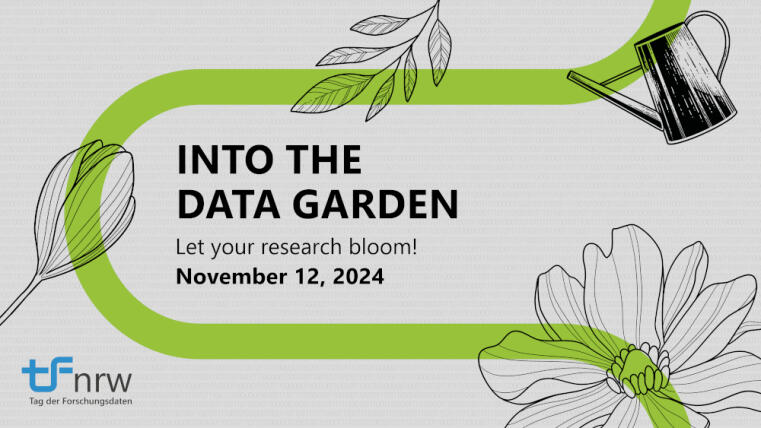Daily programme 12.11.2024
The morning will start with a keynote speech by Professor Dr. Björn Usadel from FAIRgro and Dataplant. Afterwards, three lightning talks will present examples of the successful implementation of RDM in practice. The sessions will be moderated by the state initiative fdm.nrw.
| 09:30 a.m. |
Greeting |
| 09:40 a.m. |
Keynote speech by Prof. Dr. Björn Usadel (FAIRgro and Dataplant): Beyond Abundance: Can we have enough (meta)data? |
| 10:40 a.m. |
Break |
| 10:55 a.m. |
Lightning Talks |
| 12:00 p.m. |
Farewell and end of the morning programme |
Registration for the morning programme
The event will take place virtually via ZOOM. You will receive the dial-in details after registration.
Afternoon programme for members of the University of Münster
In addition to these exciting presentations, the participating universities will offer local programmes in the afternoon, in which they will present their own RDM services and resources. Here you will have the opportunity to find out more about what support is available to you at the University of Münster, for example, and to exchange ideas with colleagues who are also interested in data management.
|
14:00–15:00 p.m.
|
Research data management in the long tail: examples from geochemistry (Dr. Marthe Klöcking)
The discipline of geochemistry describes the investigation of the chemical and physical properties of Earth materials to understand the history and dynamics of our planet from its deep interior to the surface, oceans, and the atmosphere. My usage of the term also encompasses cosmochemistry, i.e. the same principles and tools applied to extraterrestrial materials to understand the origin and evolution of the solar system. From its first definition in the early 19th century, data have been at the heart and centre of geochemistry, and today large volumes of geochemical data are being produced with a wide range modern analytical techniques ranging from mass spectrometry to atom probe tomography. Geochemical data are as diverse as the materials analysed and the techniques employed. They are a classical example of "long tail" data, meaning they are relatively small in volume compared to other disciplines, but highly variable in nature. As a consequence, research data management in geochemistry is a complex task that requires a high degree of flexibility to incorporate ever evolving data types.
In this talk, I will give a broad overview of the history of data in geochemistry and the co-evolution of data management practices in the discipline. I will highlight the challenges of making long tail data interoperable and discuss current progress through the OneGeochemistry initiative and the WorldFAIR project. I will illustrate my talk with practical examples from a range of different research projects within the Institute of Mineralogy.
|
|
15:00–15:45 p.m.
|
Cataloguing and managing research data – an introduction (Patrick Dinger, Nicole Roloff and Maike Sommer)
The University and State Library (ULB) provides researchers and teachers at the University with modern services for cataloguing and managing a wide range of research data. Thanks to fylr as a flexible database system, projects in the development of knowledge resources, the management of images or the description of media and collection objects with metadata are just as possible as the realization of individual research projects.
On the NRW Research Data Day, we will provide an introduction to working with fylr so that you too can maintain and manage your data professionally. By uploading images, importing existing research data or adding new objects, we want to show you new ways to make your research data flourish.
|
Registration for the afternoon programme
The event will take place virtually via ZOOM. You will receive the dial-in details after registration.
We look forward to welcoming you to the 4th NRW Research Data Day!

